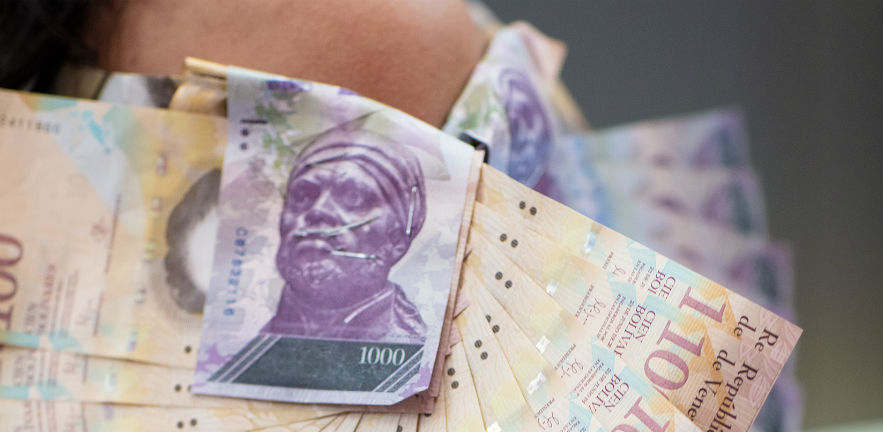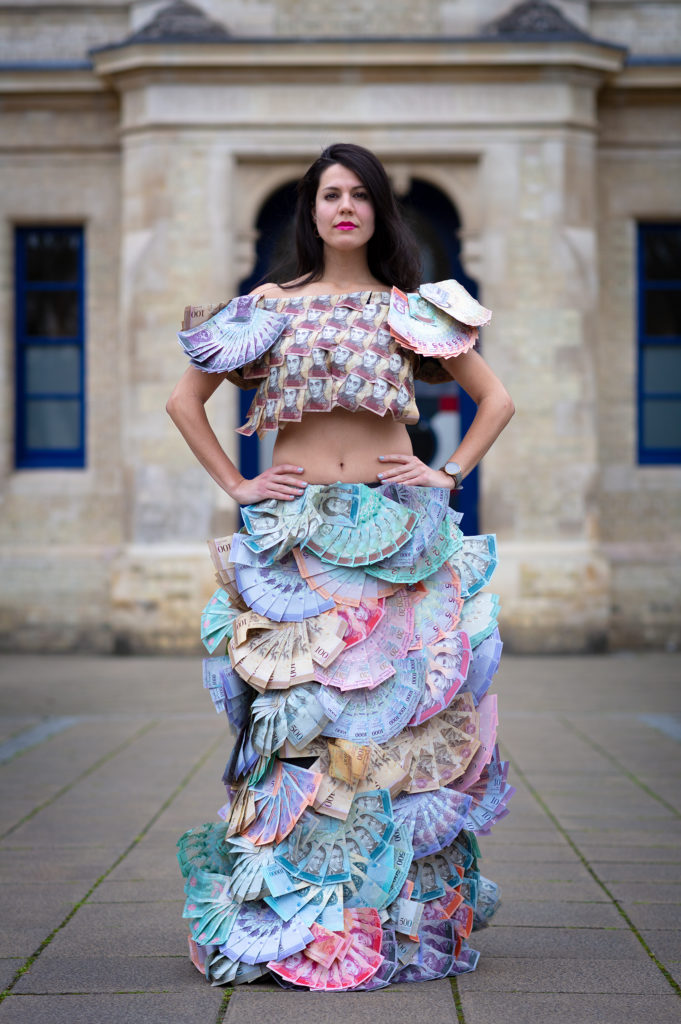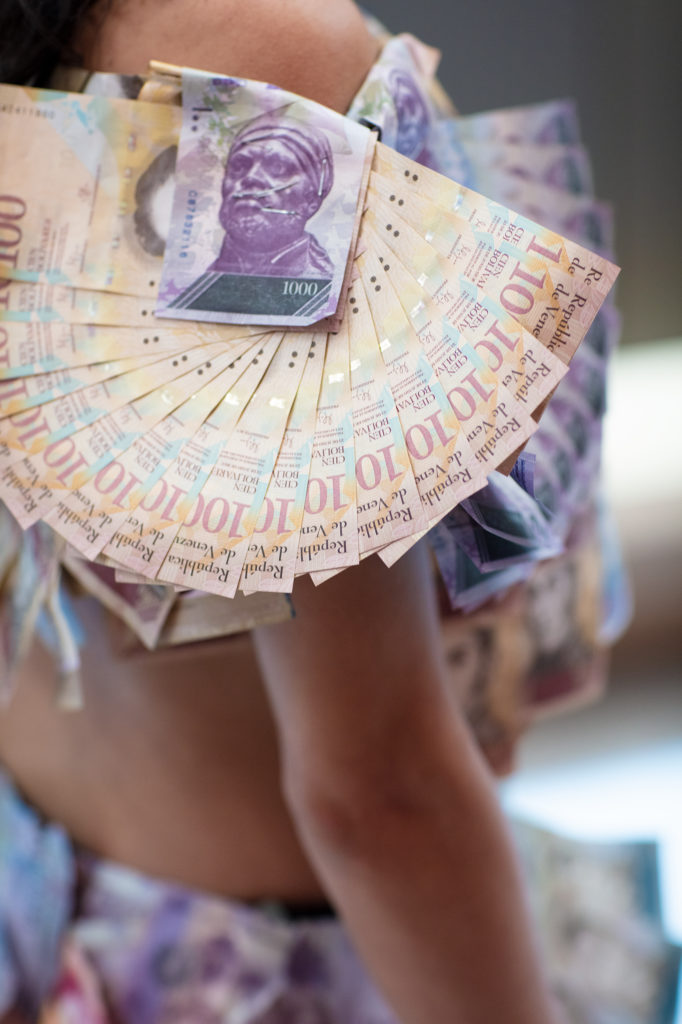Written by Katherine Hasegawa.

The dress I am wearing is worth less than a cup of coffee
Made entirely of the Venezuelan Bolivar, the sum total of the banknotes sewn together to make this dress would have been worth around £5000 in 2008.

Today, there is no value to the currency you see me wearing; and, for Venezuelans that means the supermarket shelves are empty, the communication lines are down, the transport services aren’t running, and more recently …
More than five days without power. More than five days with no access to water, or food, or news. More than five days without being able to contact those you love. More than five days of doctors manually pumping life-support machines to keep patients from death. More than five days of living in fear as looters, no more desperate than yourself, roam the streets ravaged by hunger and terror. More than five days without knowing if there will be a country left to see when the lights come back on.
Why a ‘money dress’?
Reason 1: The Injustice of hyperinflation caused by poor governance
Following the formation of President Nicolas Maduro’s government in 2013, the people of Venezuela experienced a drastic decline into a state of emergency due to the negligence of those in power.
The country has been in this state of emergency since 2015, with the economic collapse leaving the Bolivar almost worthless. Hyperinflation has driven approximately three million people to leave their loved ones and their country behind, as they search for a living that will allow them to send money to family members who are not be able, or eligible, to be employed abroad.
Indeed, the UN has predicted this number is likely to rise rapidly in the next few months, reaching five million before the end of this year.
The dire consequences of hyperinflation have been woefully under-reported. I was lucky enough to have been able to leave Venezuela in 2015, but many of my family and friends remain. Every day, I text to ask if they are ok: to ask if they have power, if they have food and if they are safe. Some days I hear back in a matter of hours; sometimes I wait for days. I can no longer call whenever I want because I do not want to use up their battery power, which they must conserve since they never know when the power might go out.
Reason 2: Taking up the challenge and determining to be a voice for change
Despite the hugely challenging circumstances my family and friends are living through in Venezuela, I am heartened by their courage and strength. Taking inspiration from their determined and unified spirit I have found in myself the courage to speak out about the state of my country, and to call upon others to stand up and assist Venezuela.
When I saw an advertisement for Anglia Ruskin University’s Global Week, an annual celebration of diversity, I knew there was something tangible that I could do.
Before long, I had settled on an idea. It felt like a big challenge, but with only a few phone calls, I quickly discovered a whole group of people who were willing to help me with my project. Inspired by the willingness of others to help and by the astonishing work of the humanitarian artist Susan Stockwell, I set about creating the money dress.

A few people involved in the production of the dress were concerned about the legal implications of using real currency. The point is that, due to the catastrophic hyperinflation of the Bolivar, the currency does not hold enough value for this to be of any consequence. It is, essentially, a paper dress. I hoped the dress would be shocking and would help people to experience, in a tangible way, the currency crisis in Venezuela. I hoped, and I continue to hope, that when people see it they are profoundly touched by the fragility of the situation in my home country, where the economic state of emergency is causing increasing fractiousness in society.
My intention was never to merely raise awareness. The dress was created to provide a visual representation of the problem; a problem which I firmly believe can be solved if we, as a privileged, compassionate community, come together. I feel confident that, among the many students in this city, we can come up with real strategies to help alleviate the challenges being faced by the people of Venezuela.
Reason 3: To crowdsource solutions
Following my presentation for ARU’s Global Week, I was pleased to be invited by the Cambridge Centre for Social Innovation to make a speech to their MSt in Social Innovation students, at the Cambridge Judge Business School. I called upon the students to turn their attention to this problem and to seek solutions for the crisis in Venezuela. Where else could be a better place to search for innovative ideas to help transform this situation?
In order to take this forward, I am currently working on establishing an online forum for people to share their ideas and brainstorm together (www.ideasforvenezuela.org – still in development). I warmly invite any and all of you to contribute any ideas; simple or grand. I am hoping to have the opportunity to speak to more students from other universities in the future and will also be continuing work with other members from the Venezuelan Community Society to provide humanitarian aid to Venezuela, and – hopefully – you to raise awareness about the situation in my homeland.
I would just like to finish by sharing my heart-felt gratitude for all people who supported me and contributed to bringing this idea into fruition. So, a big thank you to Dr Michelle Fava, Dr Neil Stott and Jessica Eve all of whom have helped me bring everything together within a challenging time-frame and have enabled me to share this idea with diverse audiences. Thank you to Imko, my Economics lecturer, who was the catalyst for this project. Thank you to my friend, Jamy Ayala, a student at the Central University of Venezuela: whilst she is in the midst of of her final year of a History degree, Jamy is actively working on the development of this project with critical opinions and real-time experiences of the dynamics of the economic, social and political crisis in Venezuela. This, to me, was the perfect example of how people, even a few, working together with a shared desire to affect positive change can achieve great things. Finally, thank you to my beloved family.
To find out more please email [email protected]
Katherine Hasegawa Perez is an International Business Management student at Anglia Ruskin University, and founder of the Latin American Society at the university. She belongs to the Venezuelan community in Cambridge and since 2012 has been actively involved with the Soka Gakkai International (SGI) which is an NGO with formal ties to the United Nations.


Jasmine Coates
The blogs you produce about Clothing and Fashion are really of good quality. I love to read your writings and shall come again to check out the latest posts.